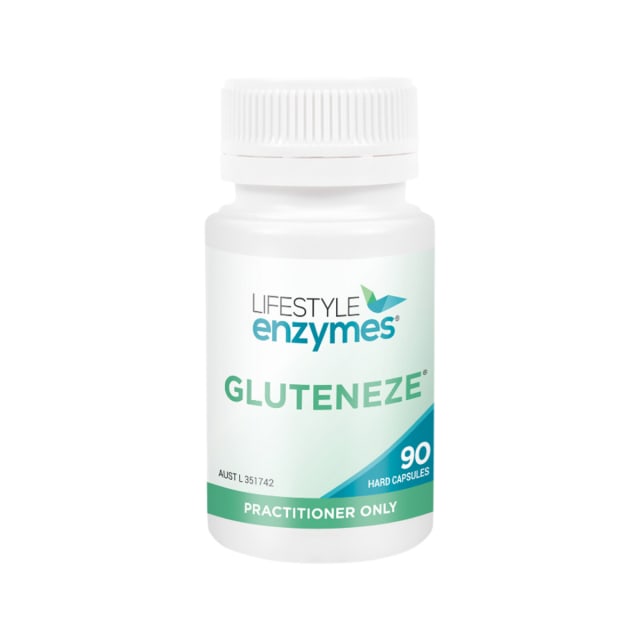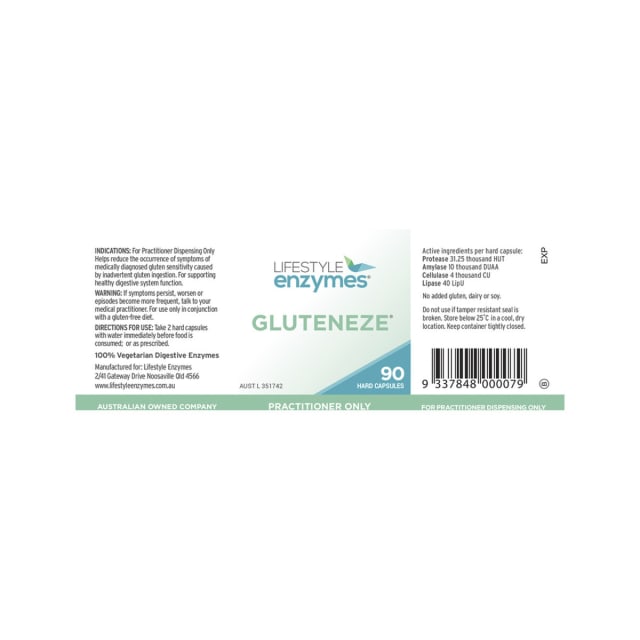To help us enhance our site, we use cookies for analytics; your data is never sold.



Lifestyle Enzymes Gluteneze
Support the Digestion of Grain Products
ifestyle Enzymes Gluteneze
Support the Digestion of Grain Products
Lifestyle Enzymes Gluteneze 15% off RRP
Pack Size: 90 Capsules
Lifestyle Enzymes Gluteneze Summary:
- Lifestyle Enzymes Gluteneze is formulated to break down gluten protein with select enzymes.
- DPP IV activity, proteolytic activity, and ample amylase activity aid with the initial digestion of the gluten glycoprotein.
- Protease 6.0 assists with resolving the inflammation related to improper gluten digestion.
Lifestyle Enzymes Gluteneze has No added gluten, dairy or soy.
Lifestyle Enzymes Gluteneze AUST L 351742
Indications
- Aids in the digestion of carbohydrates, proteins, fibres, and fats
- Helps reduce occurrence of symptoms of gluten intolerance
- Assists to disrupt biofilm formation and degrade the biofilm structure
- Aids to relieve digestive discomfort
- For supporting healthy digestive system function
- For assimilation of nutrients
Ingredients
| Each Capsule Contains: | |
| Protease (from Aspergillus oryzae) | 31250 HUT |
| Amylase (from Aspergillus oryzae) | 10000 DUAA |
| Cellulase (from Trichoderma longibrachiatum) | 4000 CU |
| Lipase | 40 LipU |
HUT = Hemoglobin Unit Tyrosine base
DUAA = Dextrinizing Units Alpha Amylase
CU = Cellulase Unit
Excipients
In a base of Microcrystalline Cellulose & Vegetable Cellulose
Allergen advice
No added gluten, dairy or soy.
Dose & Administration
Take two hard capsules with water, immediately before food is consumed, or as prescribed.
Doses may be dependent on the amount of gluten eaten and individual sensitivity.
If symptoms persist, talk to your health professional.
Patient Information
Lifestyle Enzymes Gluteneze contains a unique combination of proteases to assist in the breakdown of gluten protein.
Gluteneze
This advanced proprietary blend of enzymes is formulated to support the breakdown of gluten proteins. Featuring Protease (Peptidase) with DPP IV activity plus other proteolytic enzymes and a high potency of amylase, Lifestyle Enzymes Gluteneze helps with the digestion of gluten glycoproteins.
In addition, this blend contains Protease 6.0, which has been included for its ability to assist in resolving the inflammation that might be associated with faulty gluten digestion.
Amylase and Cellulase support the breakdown of carbohydrates in grains, with Cellulase further aiding the digestion of plant cell walls (cellulose), providing access to vital nutrients within.
Dipeptidyl peptidase IV (DPP IV)
Within the intestinal wall are several enzymes (called Brush border enzymes or BBM) which are important for normal gluten breakdown. One of these enzymes is dipeptidyl peptidase IV (DPP IV).
This enzyme is believed to be a major factor in gluten digestion, and it has been suggested that supplementing it at a sufficient dosage could lessen or remove the symptoms of NCGI in some individuals.
What is Gluten?
Technically, gluten is simply a storage protein found in grains and grasses. Historically, the term only applied to wheat.
Gluten is not the only protein found in grains, and virtually any of the proteins can cause adverse reactions, including allergies. For example, wheat contains four major proteins – albumin, globulin, gliadin and glutenin. Albumin and globulin are the proteins most often associated with wheat allergies, whereas gliadin and glutenin contribute more to
intolerances.
The type of gluten generally associated with gluten intolerance is called a prolamine.
There are prolamines in most cereal grains, but they don’t all typically cause intolerances. The critical ones to remember in regard to gluten intolerance and Coeliac disease are present in wheat (gliadin), triticale (a hybrid of wheat and rye), and rye (secalin), barley (hordein) and to a lesser degree in oats (avenins).
What is the Enzyme Factor?
Recent years have seen a growing body of research on digestive diseases, specifically concerning the symptoms of medically-diagnosed gluten sensitivity due to its widespread nature and lack of suitable treatments. This research has identified various essential characteristics contributing to the development of symptoms from unintended gluten consumption.
One of these is a group of peptides that are produced early on in gluten breakdown. These peptides contain an abundance of residues containing the amino acid proline and glutamine, which are resistant to the digestive action of pepsin and pancreatic proteases.
For those with non-coeliac gluten intolerance, these peptides trigger abdominal discomfort as they pass through the intestinal tract and are fermented by colonic bacteria.
What About Foor Allergies?
In general, the proteins or protein fragments responsible for food allergies are not broken down by cooking or by our digestive enzymes. They are absorbed through the intestinal wall equally well by allergic and non-allergic individuals.
The difference lies in the ability of a person’s immune system to effectively ignore the presence of the protein. If an individual’s immune system identifies the protein as a foreign invader, an allergic response can occur.
What About Food Intolerances?
An intolerance occurs when a direct physiologic response to a certain food is not caused by IgE (Immunoglobulin E).
Most intolerances do not even involve the immune system. Certain foods (including those that contain histamine-like substances) can even trigger a histamine-type response, such as itching and hives. The symptoms are often very similar to those caused by allergens.
What is the Dietary Stress Factor?
The excessive consumption of packaged, processed breakfast cereals, and the amount of bread consumed by current generations, brings about a concurrent inability to digest these foods properly, and it can be best described as a dietary stress factor.
Everyone, to varying degrees, is subject to dietary stress factors due to the repeated over consumption of particular foods. The enzymes selected, and the amounts used in this Gluteneze formula, are specifically designed to help overcome the side effects of the above mentioned grain products.
Warning
- For use only in conjunction with a gluten-free diet
- Dose may be dependent on the amount of gluten eaten and individual sensitivity
- Always read the label
- Dietary supplements should not replace a balanced diet
- If symptoms persist, worsen or change unexpectedly, consult your healthcare professional
Storage
Store below 25° in a cool dry location.
Keep the container tightly closed.
Online ordering is available 24/7.
Your order may ship in multiple packages to ensure they reach you as soon as possible.
If any of your products are on backorder and you are within Australia, these items will ship separately as soon as they become available at no additional cost. For international orders, your order will be sent in one package when all stock is available.
The stock availability dates are provided by our suppliers, and we endeavour to keep this information as up to date as possible on the product page.
| Within Australia | |
| Orders over $150 | $10 Express * |
| Orders under $150 | $15 Express * |
All values are Australian dollars, incl. GST.
* Deliveries to PO Boxes will be shipped standard, 2-5 days transit. Cold goods cannot be shipped to PO Boxes.
For more information, including estimated transit times and international pricing, see our Shipping page.
